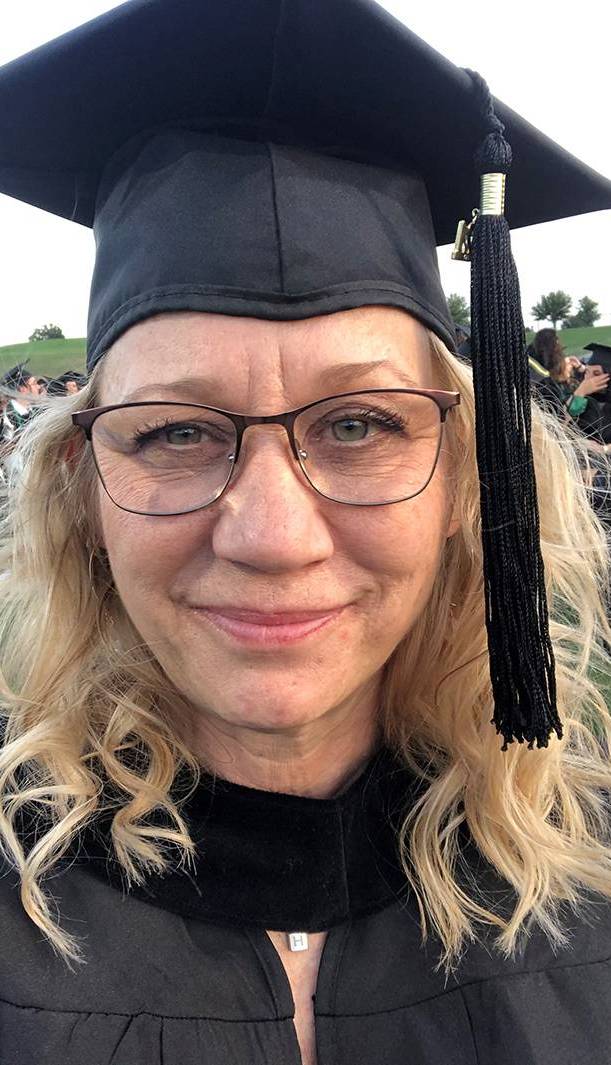 “I smoked my first joint when I was 15,” Debbie Woodcock said. “Then, when I was
in my forties, I spent 10 years being fully addicted to a lot of things. Now, thanks
to a great 90-day recovery program and some terrific counselors, I can proudly say
that I’ve been clean and sober for the past four years, and it’s my turn to help others
with substance abuse problems.”
At the age of 55, this past May Hightower graduated with an Associate of Applied Science
Degree in Alcohol & Drug Abuse Counseling from Midland College.
“I started college right out of high school, but never completed it,” Hightower explained.
“I’m sure that substance abuse played a part in my not having the discipline to do
what was necessary to stick with college the first time.”
Hightower graduated from high school in Louisville, KY in 1984 and moved to Midland
with her ex-husband in 1996 to work in her father’s oil & gas company, Hy-Bon Engineering.
The couple have two daughters, Ellie who will soon begin her junior year at Southern
Methodist University and Lauren, a 2021 graduate of Trinity High School in Midland
and soon-to-be freshman at Oklahoma University.
“My daughters are very supportive,” Debbie said. “They’ve been through a lot with
me—addiction and recovery, as well as my nervousness at going back to college as a
50+ year-old!”
Woodcock recalled when she first decided to go back to college to become a drug addiction
counselor.
“I met with the Alcohol & Drug Abuse Program Chair Stephanie Shelton; I explained
my situation to her and that I was currently in recovery. She said, ‘I’m glad you
have that knowledge. It will certainly help you become a good counselor. Now let’s
get to work.’
“My first semester, I had to take remedial math. The other students in my class were
very young, right out of high school. I felt very intimidated. The first day of
school, I think I sweated through my whole shirt! I remembered the advice of my counselors:
‘Take one day at a time and keep moving forward.’ So, I did, and I did very well
in that math class, as well as my other classes. The young kids in class really didn’t
pay much attention to me; they were doing their own thing.
“I actually made a lot of great friends in my Alcohol & Drug Abuse Counseling classes,
even though we were different ages and had different perspectives and life histories.
“I am grateful and appreciative that Midland College has a degree like Alcohol & Drug
Abuse Counseling. It really shows how progressive the college is to have this degree.
There are so many people in our country with mental health problems. It’s nice to
know that Midland College is able to provide training for people to help others overcome
these issues.
“Mental health problems and addiction go hand-in-hand. Thanks to my counselors, I
am now in the best mental and physical health I’ve been in my entire life. My counselors
taught me how to meditate, and I also practice yoga. These two things have been game
changers in my life. Through yoga and meditation, I’m able to calm the ‘constant
chatter’ that was previously in my head.”
Woodcock is now completing her practicum hours at The Springboard Center in Midland.
When she graduated from Midland College this past May, her entire family and close
friends were there to celebrate with her, including her 82-year-old father, her twin
sister, her daughters and their boyfriends, and a close friend from Kentucky.
“My family has always been there for me,” Woodcock said. “When I hit rock bottom,
had severe addiction problems, as well as PTSD and depression, they were always there
to encourage me to get well.”
After she finishes the practicum at The Springboard Center, Woodcock will then have
to complete 4,000 hours of a paid internship, which will take approximately two years,
before she can become a fully Licensed Chemical Dependency Counselor (LCDC). She
said that after she obtains her license, she would also like to become a mental health
advocate and serve as a liaison between mental health professionals and state and
federal funding opportunities.
“Even though I’m starting this career a little late in life, I don’t see an end to
it,” she explained. “Being an addict and going through recovery myself gives me a
unique outlook. I understand first-hand how therapies work. Addicts go through what
is called ‘stinking thinking’—they look at everything as negative. Through cognitive
behavior therapy, I had to rearrange my thoughts, and now I have learned how to help
others do that, as well.
“It is a truly satisfying feeling to know that at age 55, I can change my career and
do something to help others. I would tell anyone at any age that if you have a desire
to go back to school, just jump in there. Take that first step and keep going.”
|
